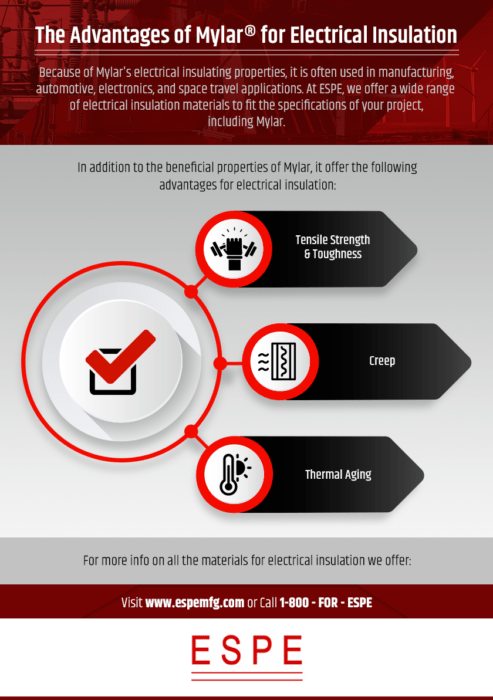Material Spotlight: Mylar®
Leave a CommentElectrical insulation is crucial in various applications to prevent the free flow of electricity. Mylar helps channel electricity where it needs to go while preventing short circuits and eliminating electrocution dangers. ESPE Manufacturing Co., Inc. has an enormous selection of materials to fabricate components and parts that can be used as electrical insulation, including Mylar.
What is Mylar?
In the 1950s, a trio of chemical companies, Hoechst, DuPont, and Imperial Chemical, developed Mylar–a stretched polyester film that is commonly used for solar filters, protective plastic coatings, insulators, space blankets, and shiny helium balloons. The technical composition of the groundbreaking material is biaxially oriented polyethylene terephthalate, or BoPET. NASA was one of the first to use and experience the benefits in its 1964 Echo II balloon.
To create Mylar, molten PET is extruded as a thin film over a chilled roller or other surface. Special machinery draws the film in biaxial directions using heated rollers. The final step involves setting the film by holding it under pressure at a high temperature. The result is an extremely smooth and pure film that adheres to itself. To prevent this, inorganic particles or metals can be embedded in the surface.
The properties of Mylar make it an excellent component for food packaging applications such as yogurt lids, roasting bags, and various foil packages. Because of its electrical insulating properties, it is often used in manufacturing, automotive, electronics, and space travel applications.
Properties
The properties listed below allow for an ideal choice in a wide variety of applications:
- Dielectric strength. Mylar is an excellent electrical insulator with a typical DC dielectric strength of 11.0 kV/mil and a typical AC dielectric strength of 7.0 kV/mil.
- Corona threshold voltage. Mylar has one of the highest corona resistance levels of any plastic film, which makes it able to endure short surges of overvoltages easily.
- Dielectric constant. The typical dielectric constant ranges from 2.8 to 3.7, depending on the temperature of the film.
- Dissipation factor. The typical dissipation factor of Mylar ranges from 0.0002 to 0.016, depending on the temperature of the film.
- Insulation Resistance. Mylar film has exceptional insulation resistance over a broad range of temperatures.
- Volume Resistivity. The volume resistivity of the material decreases as temperature increases, with Mylar Type C having about one order of magnitude higher volume resistivity than Type EL film at 257° F.
- Tracking Resistance. When dry, the material doesn’t track, but moisture can lead to tracking erosion.
- Arc Resistance. Mylar possesses an arc resistance time of 73 to 94 seconds. This shows that the material has an advantage over materials that track.
The Advantages of Mylar for Electrical Insulation
The benefits of Mylar film come from its excellent electrical insulation properties under a wide variety of conditions. In addition to those listed above, it also includes the following advantages for electrical insulation:
Tensile strength and toughness
Mylar is tough and has a higher tensile strength than most insulating materials. It has a tensile strength of 25,000 psi and elongation at 170% without breaking.
Creep
Creep measurements indicate how a material deforms under a wide range of mechanical stressors. Under various conditions, the material resists creep very well.
Thermal aging
UL thermal aging standards show that Mylar has a temperature index of 302° F. This means that it will not degrade at service temperatures below 302° F, providing a long service life for various electrical insulator applications.
Mylar Available from ESPE Manufacturing
Mylar is one of many electrical insulation materials, and it provides a particularly wide range of benefits for industries such as automotive, electrical, lighting, wind energy, and many others. At ESPE, we offer a wide range of electrical insulation materials to fit the specifications of your project. For more information about this material, or to get started on your electrical insulation solution, contact us or request a quote today.

